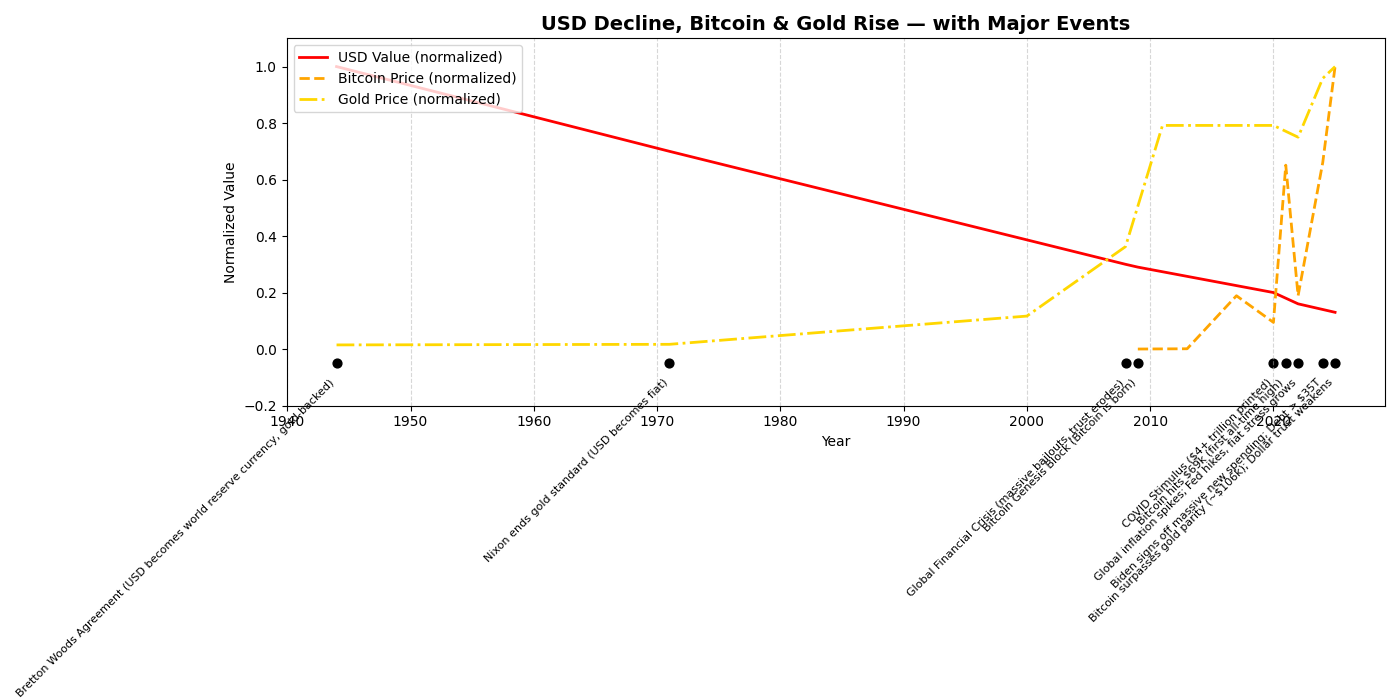
Bitcoin: A Digital Rebellion Against Centralized Control
In a world increasingly defined by centralization—be it fiat currency, data monopolies, or biased AI—Bitcoin stands in stark contrast. It’s not merely a digital currency; it’s a manifesto, a philosophy, and a movement. More than just "internet money," Bitcoin embodies a rejection of centralized control, reimagining how we think about value and trust.
The Genesis of Bitcoin: A Response to Centralization
Bitcoin emerged as a solution to the 2008 financial crisis, crafted by an anonymous individual or group known as Satoshi Nakamoto. The crisis illuminated the failings of centralized financial systems, showcasing how poorly they serve individuals. Bitcoin was designed to function independently of these outdated systems—a digital alternative built on trustless interactions.

Figure 1: Dollar devaluation over time
Key Characteristics:
-
Decentralization: Unlike traditional currencies controlled by central banks, Bitcoin operates on a public ledger (the blockchain) maintained by a distributed network of miners.
-
Scarcity: With a capped supply of 21 million coins, Bitcoin introduces a digital form of scarcity akin to precious metals. This stands in opposition to fiat currencies, which can be printed at will.
-
Pseudonymity: While transactions are publicly visible, identities remain obscured. This is a deliberate design choice, aiming to protect user privacy and promote financial freedom.
Bitcoin's Impact: More Than Just a Currency
Bitcoin isn't just a tool for transactions; it has profound implications for society and governance. Its rise has spurred conversations about individual sovereignty, monetary policy, and technological empowerment.
Noteworthy Impacts:
-
Financial Inclusion: Bitcoin offers access to financial services for the unbanked. In countries with unstable economies, it provides a more reliable store of value than local currencies.
-
Censorship Resistance: Unlike traditional banking systems, Bitcoin transactions can’t be easily blocked or reversed. This is crucial in regions facing authoritarian regimes, where access to capital can be restricted.
-
Programmable Money: With the advent of the Lightning Network, Bitcoin is evolving to support microtransactions and smart contracts, expanding its utility beyond simple transfers.
The Challenges Ahead: Navigating Adoption and Misunderstanding
Despite its potential, Bitcoin faces skepticism and regulatory scrutiny. Concerns around energy consumption, volatility, and illicit use often overshadow its benefits. It’s essential to dissect these narratives critically:
Common Misconceptions:
-
Energy Consumption: While Bitcoin mining is energy-intensive, it incentivizes the use of renewable energy sources. Reports suggest that over 50% of Bitcoin mining utilizes renewable energy (source: Cambridge Centre for Alternative Finance).
-
Volatility: Yes, Bitcoin’s price swings are significant. But consider this: the early internet was also volatile and misunderstood. Stability often comes with maturity. For example, Bitcoin's adoption is gradually increasing, suggesting that its volatility may decrease over time.
-
Illicit Activities: The narrative that Bitcoin is predominantly used for illegal transactions is exaggerated. A 2022 study showed that less than 1% of Bitcoin transactions were associated with illicit activities (source: Chainalysis).
Bitcoin's Community: More Than Just Speculators
The Bitcoin community is vast and diverse—ranging from cypherpunks and libertarians to everyday users seeking financial security. This shared ethos of promoting personal freedom and skepticism toward centralized authority unites them.
Notable Figures:
-
Catherine Wood (CEO, ARK Invest): Advocates for Bitcoin’s role as digital gold and an essential component of a diversified portfolio.
-
Jack Dorsey (co-founder of Twitter): A strong supporter of Bitcoin, he views it as the native currency of the internet.
-
Elon Musk (CEO, SpaceX): His fluctuating tweets have stirred the market, but his insights into Bitcoin’s potential to replace fiat currency are worth noting.
Conclusion: The Road Ahead
Bitcoin remains a work in progress, both as a technological platform and a cultural movement. As we move deeper into an era dominated by centralized control, Bitcoin offers a beacon for those who value autonomy, decentralization, and transparency.
Questions for Reflection
- How do you perceive the balance between anonymity and accountability in digital currencies?
- As Bitcoin matures, will it remain a speculative asset or solidify its role as a means of exchange?
Further Reading
- The Bitcoin Standard: The Decentralized Alternative to Central Banking
- Bitcoin is Money: A Critical Perspective
- Understanding Bitcoin’s Energy Consumption
Music While You HODL
"Money for Nothing" by Dire Straits. Perfect for contemplating your financial future in the world of Bitcoin.